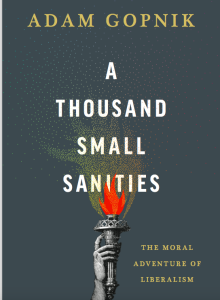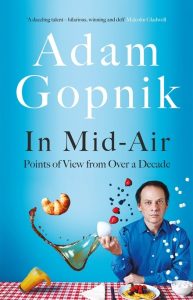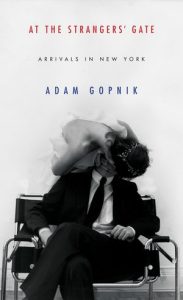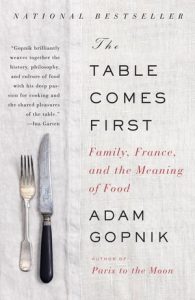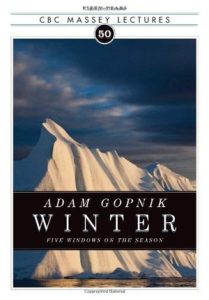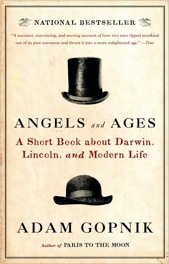

Adam Gopnik
International Bestselling Author
Famed New Yorker Staff Writer
Commentator, Lecturer, Storyteller
National Magazine Award Winner

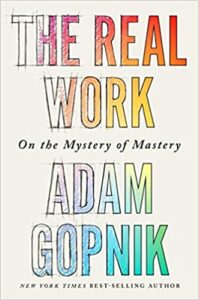
Readings &
Lecture Topics
- The Unity of American Art
- The Moral Adventures of Liberalism
- A Thousand Small Sanities: In Defense of Liberalism
- The Mystery of Mastery
- The Humanities as the Foundation of the Sciences
- Rituals of Taste: The Role of Food in Literature
- The Art & Craft of Storytelling
- A Moth Storytelling Evening with Adam Gopnik
Biography
“Adam Gopnik is one of the greatest thinkers and wordsmiths of our age.” —Krista Tippett
“Gopnik’s performances sparkle with buoyant humanity, philosophical ruminations, strikingly memorable images. He has a simpatico relationship with the audience, who connect immediately with the clever humor and heart-felt cadences strung together by this poetic and marvelous craftsman. His ninety minute show is just smashing.” —TheaterPizazz
“A dazzling talent—hilarious, winning and deft.” —Malcolm Gladwell
Adam Gopnik, legendary and beloved writer for the New Yorker, has—in his three decades with the magazine—written fiction, humor, memoirs, critical essays, and reported pieces from at home and abroad. He was the magazine’s art critic from 1987 to 1995, and the Paris correspondent from 1995 to 2000. Gopnik has received three National Magazine awards for essays and for criticism, the George Polk Award for Magazine Reporting, and the Canadian National Magazine Award Gold Medal for arts writing. In March of 2013, he was awarded the medal of Chevalier of the Order of Arts and Letters.
An international bestselling author, his newest book is All That Happiness Is (2024). He is also the author of A Thousand Small Sanities: The Moral Adventures of Liberalism (2019), a book written as a long letter to his 18-year-old daughter who was badly shaken by the election of 2016. Gopnik offers a stirring defense of liberalism against the dogmatisms of our time and expounds on why liberal humanism is wise, good and permanent. A Thousand Small Sanities is a manifesto rooted in the lives of people who invented and extended the liberal tradition. He shows us why liberalism is one of the great moral adventures in human history—and why, in an age of autocracy, our lives may depend on its continuation. Praising the book, Krista Tippett, host of On Being, writes: “Adam Gopnik is one of the greatest thinkers and wordsmiths of our age, and this book may be his most masterful, meaningful, and enjoyable yet. He turns his sweeping intellectual imagination into a conversation with a cross-partisan American longing for a renewal of common life that scarcely knows how to name itself. In an age in which we’ve connected ourselves with scale but without quality, and fractured communal cohesion in part by forgetting our shared liberal inheritance, this book is essential, redemptive reading.”
Adam’s numerous books include: The Real Work: On the Mystery of Mastery (2023); In Mid-Air, Points of View from Over a Decade (2018), a collection of witty, illuminating essays on life, art, and family; At The Strangers’ Gate: Arrivals in New York (2017), a memoir that captures the romance of New York City in the 1980s; The Table Comes First: Family, France, and the Meaning of Food (2012), a beguiling tour of the morals and manners of our present food mania, in search of eating’s deeper truths; Winter: Five Windows on the Season (2011), the 50th anniversary Massey Lecture Gopnik delivered for the CBC, broadcast throughout Canada; Angels And Ages: A Short Book About Lincoln, Darwin And Modern Life (2009), a national bestseller which the Telegraph in London called “the essay every essayist would like to have written.”; Through The Children’s Gate: A Home in New York (2007), a portrait of an altered New York, how life moves forward after tragedy, and about raising two children in the shadow of many kinds of sadness; and Paris To The Moon (2000), hailed by the New York Times as “the finest book on France in recent years.”
Adam has written two children’s adventure books: The King’s Window (2005), called by Journal of Fantasy & Science Fiction, “a spectacularly fine children’s novel…children’s literature of the highest order, which means literature of the highest order.” and The Steps Across the Water (2010), which chronicles the adventures of a young girl, Rose, in U Nork.
Scintillating and brilliant, known for his wit and erudition, Adam is an sought after lecturer on many topics, and will tailor his talk to meet the needs of his audience. At ease on the stage, speaking with humor, eloquence, and insight, he shares delightful stories and illuminates—with his singular keen observation—striking insights of modern life and culture, and what it takes to be a citizen of the world in this time. In 2011, he delivered the prestigious Canadian Broadcasting Corporation’s Massey Lectures. In addition to the Massey series, his more formal and extended lectures have included the New York Public Library/Oxford University Press lectures in New York; the Phillips Lecture in Washington and the Whitney Lecture in New York, and the Shapiro Lectures at Boston’s Museum of Fine Arts. In 2006, he also hosted and presented an hour-long film about New York, Lighting Up New York, for the BBC in London.
A consummate, funny, and vibrant storyteller, Adam performs his one man show “The Gates” based on ‘comic-personal’ material developed with The Moth. A frequent participant The Moth’s storytelling evenings, he has spoken on a number of subjects, ranging from marital arguments to keeping up with the latest teen vocabulary. With every story, he fully engages his audience, showing us who we are, especially through our relation to family and place.
He is also engaged in many musical projects, working both as a lyricist and libretto writer. His first musical, The Most Beautiful Room In New York, written in collaboration with the composer David Shire, opened May 2017 at the Long Wharf Theater in New Haven.
Gopnik’s work has been anthologized many times, in Best American Essays, Best American Travel Writing, Best American Sports Writing, Best American Food Writing, and Best American Spiritual Writing. He still often writes from Paris for the New Yorker, has edited the anthology Americans In Paris for the Library of America, and has written a number of introductions to new editions of works by Maupassant, Balzac, Proust, Victor Hugo and Alain-Fournier. In January of 2021, he was named a chevalier of the Legion D’Honneur, France’s highest civilian and military award, by President Emmanuel Macron.
Adam Gopnik was born in Philadelphia and raised in Montreal. He received his BA. in Art History from McGill University, before completing his graduate work at the Institute of Fine Arts, New York University. He lives in New York with his wife, filmmaker Martha Parker, and their two children, Luke Auden and Olivia Esme Claire.
Visit Author WebsiteVideos
Publications
All That Happiness Is
Nonfiction, 2024
Our society is obsessed with achievement. Young people are pushed toward the next test or the “best” grammar school, high school, or college they can get into. Adults push themselves toward the highest-paying, most prestigious jobs, seeking promotions and public recognition. As Adam Gopnik points out, the result is not so much a rat race as a rat maze, with no way out. Except one: to choose accomplishment over achievement. Achievement, Gopnik argues, is the completion of the task imposed from outside. Accomplishment, by contrast, is the end point of an engulfing activity one engages in for its own sake. From stories of artists, philosophers, and scientists to his own fumbling attempts to play Beatles songs on a guitar, Gopnik demonstrates that while self-directed passions sometimes do lead to a career, the contentment that flows from accomplishment is available to each of us. A book to read and return to at any age, All That Happiness Is offers timeless wisdom against the grain.
The Real Work: On the Mystery of Mastery
Nonfiction, 2023
For decades, Adam Gopnik has been one of our most beloved writers, a brilliantly perceptive critic of art, food, France, and more. But recently, he became obsessed by a fundamental matter: How did the people he was writing about learn their outlandish skill, whether it was drawing a nude or baking a sourdough loaf? In The Real Work―his title the term magicians use for the accumulated craft that makes for a great trick―Gopnik apprentices himself to an artist, a dancer, a boxer, and even a driving instructor (from the DMV), among others, trying his late-middle-age hand at things he assumed were beyond him. He finds that mastering a skill is a process of methodically breaking down and building up, piece by piece―and that true mastery, in any field, requires mastering other people’s minds. Exuberant and profound, The Real Work is ultimately about why we relentlessly seek to better ourselves in the first place.
A Thousand Small Sanities
Nonfiction, 2019
The New York Times-bestselling author offers a stirring defense of liberalism against the dogmatisms of our time. Not since the early twentieth century has liberalism, and liberals, been under such relentless attack, from both right and left. The crisis of democracy in our era has produced a crisis of faith in liberal institutions and, even worse, in liberal thought. A Thousand Small Sanities is a manifesto rooted in the lives of people who invented and extended the liberal tradition. Taking us from Montaigne to Mill, and from Middlemarch to the civil rights movement, Adam Gopnik argues that liberalism is not a form of centrism, nor simply another word for free markets, nor merely a term denoting a set of rights. It is something far more ambitious: the search for radical change by humane measures. Gopnik shows us why liberalism is one of the great moral adventures in human history–and why, in an age of autocracy, our lives may depend on its continuation.
In Mid-Air, Points of View from Over a Decade
Essays, 2018
In Mid-Air is a collection of witty, illuminating essays on life, art and family. Known for his ability to perceive ‘the whole world in a grain of sand’, he uses this format to take a dizzying range of subjects and intricately explore their meaning to our lives—as people, as citizens and as families. From how he works so that his daughter can have holes in her clothes, to why appropriation is more empowering than oppressing; from French sex to binge-watching TV, from the secret of a happy marriage to why we should mention the war—each topic is illuminated by his erudition and wit. As in their original form on the radio, Gopnik’s essays—each one a pleasure garden of wry confessions, self-deprecating asides, wordplay and striking insights—feel like the most intimate of conversations between writer and reader; yet at the same time they capture a public forum of pithy debate and tender persuasion. Above all, In Mid-Air initiates a sense of wonder in the ordinary that yearns to be shared.
At The Strangers' Gate: Arrivals In New York
(Memoir, 2017)
“A riveting and incandescent chronicle of personal evolution set within the ever-morphing, cocaine-stoked crucible of ferocious ambition that was 1980s Manhattan.” —Booklist (starred review)
A memoir that captures the romance of New York City in the 1980s. When Adam Gopnik and his soon-to-be-wife, Martha, left the comforts of home in Montreal for New York, the city then, much like today, was a pilgrimage site for the young, the arty, and the ambitious. But it was also becoming a city of greed, where both life’s consolations and its necessities were increasingly going to the highest bidder. At the Strangers’ Gate builds a portrait of this particular moment in New York through the story of this couple’s journey–from their excited arrival as aspiring artists to their eventual growth into a New York family. Gopnik transports us to his tiny basement room on the Upper East Side, and later to SoHo, where he captures a unicorn: an affordable New York loft. He takes us through his professional meanderings, from graduate student-cum-library-clerk to the corridors of Condé Nast and the galleries of MoMA. Between tender and humorous reminiscences, including affectionate portraits of Richard Avedon, Robert Hughes, and Jeff Koons, among many others, Gopnik discusses the ethics of ambition, the economy of creative capital, and the peculiar anthropology of art and aspiration in New York, then and now.
The Table Comes First
(Nonfiction, 2012)
A beguiling tour of the morals and manners of our present food mania, in search of eating’s deeper truths. Never before have we cared so much about food. It preoccupies our popular culture, our fantasies, and even our moralizing. With our top chefs as deities and finest restaurants as places of pilgrimage, we have made food the stuff of secular seeking and transcendence, finding heaven in a mouthful. But have we come any closer to discovering the true meaning of food in our lives? With inimitable charm and learning, Adam Gopnik takes us on a beguiling journey in search of that meaning as he charts America’s recent and rapid evolution from commendably aware eaters to manic, compulsive gastronomes.
Winter: Five Winters on the Season
(CBC Massey Lecture, 2011)
A taste for winter, a love of winter — “a mind for winter” — is for many a part of the modern human condition. International bestselling author Adam Gopnik does for this storied season what he did for the City of Light in the New York Times bestseller Paris to the Moon. Here he tells the story of winter in five parts: Romantic Winter, Radical Winter, Recuperative Winter, Recreational Winter, and Remembering Winter. In this stunningly beautiful meditation, Gopnik touches on a kaleidoscope of subjects, from the German romantic landscape to the politics of polar exploration to the science of ice. And in the end, he pays homage to what could be a lost season — and thus, a lost collective cultural history — due to the threat of global warming. Through delicate, enchanting, and intricate narrative detail, buoyed by his trademark gentle wit, Gopnik draws us into another magical world and makes us look at it anew.
Angels and Ages: A Short Book About Darwin, Lincoln, and Modern Life
(Nonfiction, 2010)
ANGELS AND AGES: A SHORT BOOK ABOUT DARWIN, LINCOLN, AND MODERN LIFE
In this captivating double life, Adam Gopnik searches for the men behind the icons of emancipation and evolution. Born by cosmic coincidence on the same day in 1809 and separated by an ocean, Lincoln and Darwin coauthored our sense of history and our understanding of man’s place in the world. Here Gopnik reveals these two men as they really were: family men and social climbers, ambitious manipulators and courageous adventurers, grieving parents and brilliant scholars. Above all we see them as thinkers and writers, making and witnessing the great changes in thought that mark truly modern times.
Articles & Audio
Read What’s In Print
• What Made Buster Keaton’s Comedy So Modern? by Adam Gopnik – The New Yorker
• A Thousand Small Sanities is a Lesson in Understanding Liberalism – NPR
• Culture is Armor, Interview with Adam Gopnik – LA Review of Books
• 9 Questions with Adam Gopnik – Vox
• An Interview With A Thousand Small Sanities Author Adam Gopnik — New York Magazine
• Review of Lecture: In Defense of Liberalism – Baltimore Jewish Times
• Interview with Adam Gopnik – The Paris Review
• Interview: On Collecting Memories – The Creative Independent
Listen to Audio
• Stop Saying Impeachment is Political – WNPR
• A Thousand Small Sanities – WGBH
• Adam Gopnik on Sibling Rivalry, Stand-Up, and Liberalism – Slate
Selected Writings
• Despite Everything, The Pleasures of Standing in Line to Vote – The New Yorker
• Wine, War, Donald Trump, and Emmanuel Macron – The New Yorker
• The Las Vegas Massacre Report and the Rise of Second Amendment Nihilism – The New Yorker
Excerpt from Paris to the Moon
Not long after we moved to Paris, in the fall of 1995, my wife, Martha, and I saw, in the window of a shop on the rue Saint-Sulpice, a nineteenth-century engraving, done in the manner, though I’m now inclined to think not from the hand, of Daumier. It shows a train on its way from the Right Bank of Paris to the moon. The train has a steam locomotive and six cars, and it is chugging up a pretty steep track. The track is supported on two high, slender spires that seem to be anchored somewhere in the Fifth Arrondissement (you can see the Panthéon in silhouette nearby), and then the track just goes right up and touches the full moon up in the clouds. I suppose the two pillars are stronger than they look. The train is departing at twilight–presumably it’s an overnight trip–and among the crowd on the ground below, only a couple of top-hatted bourgeois watch the lunar express go on its way with any interest, much less wonder. Everybody else in the crowd of thirteen or so people on the platform, mostly moms and dads and kids, are running around and making conversation and comforting children and buying tickets for the next trip and doing all the things people still do on station platforms in Paris. The device on the ticket window, like the title of the cartoon, reads: “A Railroad: From Paris to the Moon.”
The cartoon is, in part, a satire on the stock market of the time and on railway share manipulations. (“Industry,” the caption begins, “knows no more obstacles.”) But the image cast its spell on us, at least, because it seemed to represent two notions, or romances, that had made us want to leave New York and come to Paris in the first place. One was the old nineteenth-century vision of Paris as the naturally modern place, the place where the future was going to happen as surely as it would happen in New York. If a train were going to run to the moon, that train would originate from the Gare du Nord, with Parisian kids getting worn out while they waited.
But the image represented another, more intense association, and that is the idea that there is, for some Americans anyway, a direct path between the sublunary city and a celestial state. Americans, Henry James wrote, “are too apt to think that Paris is the celestial city,” and even if we don’t quite think that, some of us do think of it as the place where tickets are sold for the train to get you there. (Ben Franklin thought this, and so did Gertrude Stein, and so did Henry Miller. It’s a roomy idea.) If this notion is pretty obviously unreal, and even hair-raisingly naive, it has at least the excuse of not being original. When they die, Wilde wrote, all good Americans go to Paris. Some of us have always tried to get there early and beat the crowds.

